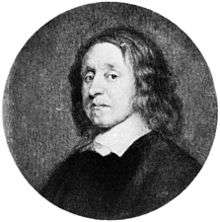Henry Cromwell
| Henry Cromwell | |
|---|---|
 | |
| Lord Deputy of Ireland | |
| Personal details | |
| Born |
20 January 1628 Huntingdon |
| Died |
23 March 1674 (aged 46) Wicken, Cambridgeshire |
| Spouse(s) | Elizabeth Russell |
| Profession | Politician, soldier |
| Religion | Puritan (Independent) |
Henry Cromwell (20 January 1628 – 23 March 1674) was the fourth son of Oliver Cromwell and Elizabeth Bourchier, and an important figure in the Parliamentarian regime in Ireland.
Early life
He was born at Huntingdon and educated at Felsted School and Emmanuel College, Cambridge.[1] He served under his father during the latter part of the English Civil War. His active life, however, was mainly spent in Ireland, whither he took some troops to assist Oliver early in 1650, and he was one of the Irish representatives in the Barebones Parliament of 1653. In 1653 Henry married Elizabeth (died 1687), daughter of Sir Francis Russell, who went on to bear him five sons and two daughters.
Ireland
He was the seventh Chancellor of Trinity College, Dublin between 1653 and 1660.
In 1654 he was again in Ireland, and after making certain recommendations to his father, now lord protector, with regard to the government of that country, he became major-general of the forces in Ireland and a member of the Irish council of state, taking up his new duties in July 1655. Nominally Henry was subordinate to the lord-deputy, Charles Fleetwood, but Fleetwood's departure for England in September 1655 left him for all practical purposes the ruler of Ireland. He moderated the lord-deputy's policy of deporting the Irish, and unlike him he paid some attention to the interests of the English settlers. Moreover, again unlike Fleetwood, he appears to have held the scales evenly between the different Protestant sects, and his undoubted popularity in Ireland is attested by Clarendon.
In November 1657 Henry himself was made lord-deputy; but before this time he had refused a gift of property worth £1500 a year, basing his refusal on the grounds of the poverty of the country, a poverty which was not the least of his troubles. In 1657 he advised his father not to accept the office of king, although in 1654 he had supported a motion to this effect; and after the dissolution of Cromwell's second parliament in February 1658 he showed his anxiety that the protector should act in a moderate and constitutional manner. After Oliver's death Henry hailed with delight the succession of his brother Richard to the office of protector, but although he was now appointed lieutenant and governor-general of Ireland, it was only with great reluctance that he remained in that country.
Later life
Having rejected proposals to assist in the restoration of Charles II, Henry was recalled to England in June 1659 just after his brother's fall; quietly obeying this order he resigned his office at once. Although he lost some property at the Restoration, he was allowed after some solicitation to keep the estate he had bought in Ireland.
His concluding years were passed peacefully at Spinney Abbey in Wicken, Cambridgeshire. He was unmolested by the government, and, indeed, the king on one occasion visited him there. He died at Wicken and is buried in the parish church alongside his wife.
Ancestry
| Ancestors of Henry Cromwell | ||||||||||||||||||||||||||||||||||||||||||||||||||||||||||||||||||||||||||||||||||||||||||||||||||||||||||||||||||||||||||||||||||||||||||||||||||||||||||||||||||||||||||||||||||||||||||||||||||||||||||||||||||||||||||||||||||||||||||||||||||||||||||||||||||||||||||||||||||||||||||||||||||||||||||||||||||||||||||||||||||||||||||||||||||||||||||||||||||||||||||||||||||||||||||||||||||||||||||||||
|---|---|---|---|---|---|---|---|---|---|---|---|---|---|---|---|---|---|---|---|---|---|---|---|---|---|---|---|---|---|---|---|---|---|---|---|---|---|---|---|---|---|---|---|---|---|---|---|---|---|---|---|---|---|---|---|---|---|---|---|---|---|---|---|---|---|---|---|---|---|---|---|---|---|---|---|---|---|---|---|---|---|---|---|---|---|---|---|---|---|---|---|---|---|---|---|---|---|---|---|---|---|---|---|---|---|---|---|---|---|---|---|---|---|---|---|---|---|---|---|---|---|---|---|---|---|---|---|---|---|---|---|---|---|---|---|---|---|---|---|---|---|---|---|---|---|---|---|---|---|---|---|---|---|---|---|---|---|---|---|---|---|---|---|---|---|---|---|---|---|---|---|---|---|---|---|---|---|---|---|---|---|---|---|---|---|---|---|---|---|---|---|---|---|---|---|---|---|---|---|---|---|---|---|---|---|---|---|---|---|---|---|---|---|---|---|---|---|---|---|---|---|---|---|---|---|---|---|---|---|---|---|---|---|---|---|---|---|---|---|---|---|---|---|---|---|---|---|---|---|---|---|---|---|---|---|---|---|---|---|---|---|---|---|---|---|---|---|---|---|---|---|---|---|---|---|---|---|---|---|---|---|---|---|---|---|---|---|---|---|---|---|---|---|---|---|---|---|---|---|---|---|---|---|---|---|---|---|---|---|---|---|---|---|---|---|---|---|---|---|---|---|---|---|---|---|---|---|---|---|---|---|---|---|---|---|---|---|---|---|---|---|---|---|---|---|---|---|---|---|---|---|---|---|---|---|---|---|---|---|---|---|---|---|---|---|---|---|---|---|---|---|---|---|---|---|---|---|---|---|---|---|---|---|---|---|---|---|---|---|---|---|---|---|---|---|---|---|---|
| ||||||||||||||||||||||||||||||||||||||||||||||||||||||||||||||||||||||||||||||||||||||||||||||||||||||||||||||||||||||||||||||||||||||||||||||||||||||||||||||||||||||||||||||||||||||||||||||||||||||||||||||||||||||||||||||||||||||||||||||||||||||||||||||||||||||||||||||||||||||||||||||||||||||||||||||||||||||||||||||||||||||||||||||||||||||||||||||||||||||||||||||||||||||||||||||||||||||||||||||
Bibliography
- Cunningham, John. Conquest and Land in Ireland: The Transplantation to Connacht, 1649-1680. Boydell Press, 2011.
References
| Wikimedia Commons has media related to Henry Cromwell. |
| Wikisource has original text related to this article: |
- ↑ "Cromwell, Henry (CRML644H)". A Cambridge Alumni Database. University of Cambridge.
 This article incorporates text from a publication now in the public domain: Chisholm, Hugh, ed. (1911). "article name needed". Encyclopædia Britannica (11th ed.). Cambridge University Press.
This article incorporates text from a publication now in the public domain: Chisholm, Hugh, ed. (1911). "article name needed". Encyclopædia Britannica (11th ed.). Cambridge University Press.
| Political offices | ||
|---|---|---|
| Preceded by Charles Fleetwood |
Lord Deputy of Ireland 1657–1659 |
Succeeded by Edmund Ludlow |